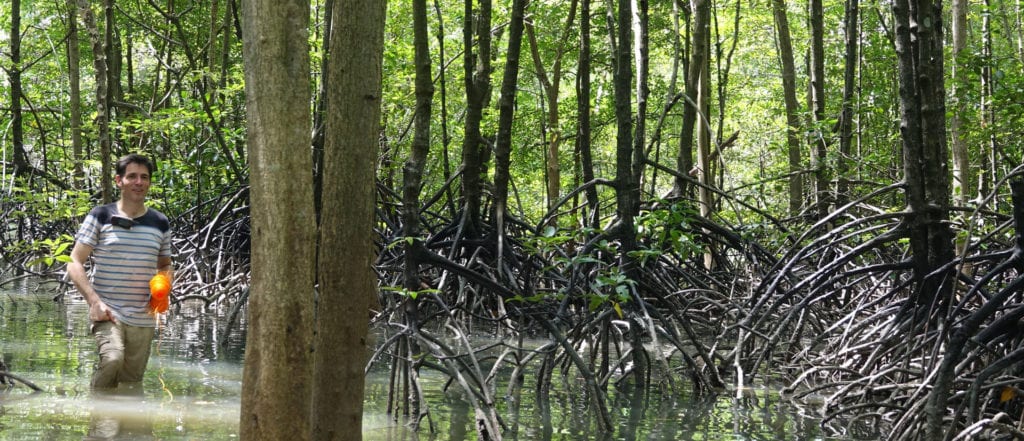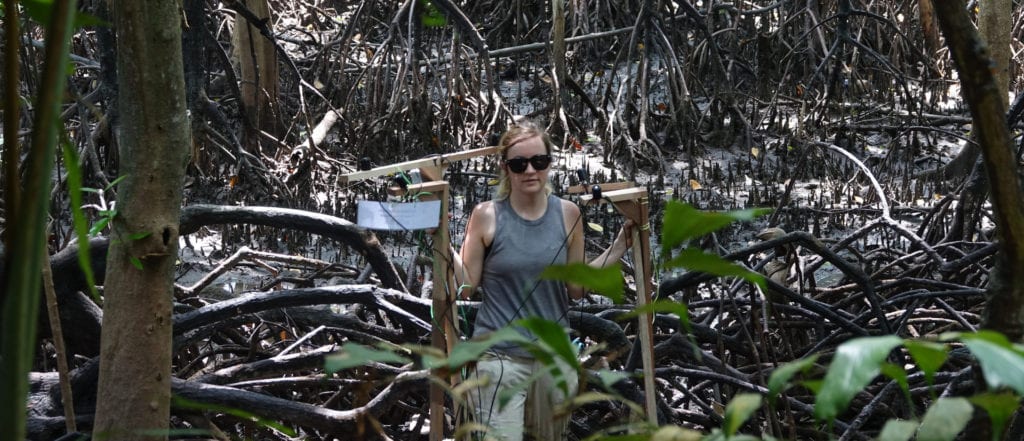Yale-NUS faculty and staff involved in global action on climate change
Climate change is a global problem where the effects transcend the environment to politics and society. As such, it necessitates global, collective action to mitigate the risks and generate solutions. At Yale-NUS College, there are several faculty and staff members who play a big role in the global action on climate change.
At the start of this year, Assistant Professor of Social Sciences (Environmental Studies) Angel Hsu, spoke on a number of panels at the 2020 World Economic Forum (WEF) Annual Meeting in Davos, Switzerland, about climate change and its intersection with technology. In particular, she served as the chair of the WEF’s Global Future Council for 4IR (Fourth Industrial Revolution) and Global Public Goods and launched Frontier 2030, the new WEF platform.

“The aim of this new platform is essentially to help scale 4IR technologies (e.g. AI, blockchain, Internet of things (IoT), big data, robotics, drones) to meet Sustainable Development Goals. We are still far behind in solving global challenges and this platform is meant to bring the most influential actors together from government, business, academia, and civil society to accelerate the rapid and responsible deployment of these new technologies,” she explained.
Some of the projects under her research group, Data-Driven Lab which she founded in 2015, demonstrates the importance of 4IR technology in scaling climate change solutions. Data-Driven Lab is a research group that uses innovative data analytics to help policymakers and state leaders understand the reality of climate change and the scope of actions available to them.
For example, one of its projects currently examines the use of blockchain for a global accounting system. According to the National Science Foundation, a whole range of actors – states, businesses, investors and civil society (non-state), are capable of catalysing and executing climate change efforts. However, there is difficulty in monitoring and analysing the wide diversity of efforts. As such, blockchain, as a “decentralised and immutable ledger” has the potential to address “accounting and knowledge gaps” and can better help different actors coordinate and complement their efforts.
Another professor who is also involved in several global projects that tackle the science of climate change is Assistant Professor of Science (Environmental Studies), Michiel van Breugel. When he was a postdoctoral fellow at the Smithsonian Tropical Research Institute (STRI), he helped to set up two of the largest long-term field studies of their kind in the tropics. The field studies examine the different factors that affect the natural regeneration of forests in the tropics. Forests are intrinsically important to climate change as they are a great influence on the global carbon cycle.
 Assistant Professor Michiel van Breugel doing field research at a mangrove forest. Image provided by Assistant Professor Michiel van Breugel.
Assistant Professor Michiel van Breugel doing field research at a mangrove forest. Image provided by Assistant Professor Michiel van Breugel.
One of the goals of the project was to establish a platform for collaborative research on vegetation dynamics and forest succession with colleagues from different disciplines of work. This has proven incredibly successful as the main project has spawned off several parallel projects with other leading experts from research institutes all over the world.
Although most of Asst Prof van Breugel’s projects do not directly study the relationship between forests and climate, their work has produced compelling data and insights that contribute greatly to this understanding.
For instance, the data collected from the various experiments has contributed to the mapping of forest biomass over large spatial scales. This is particularly useful for the climate science fields of climate modelling, carbon offset accounting and the monitoring of compliances with national forest conservation pledges.
Leveraging on his expertise and experience in setting up field study projects in Panama, Asst Prof van Breugel is currently setting up a long-term study of the regeneration of mangroves in Singapore. Working with him is Dr Taylor Sloey, Laboratory Manager, Field Research at the Yale-NUS College Environmental Sciences Laboratories. She explained that mangrove forests are one of the most efficient ecosystems in terms of removing carbon from the atmosphere and storing it in the soil. For this ecosystem service, among many others, there is a need to preserve and restore mangrove forests worldwide. One of the preliminary goals of the project is to understand how factors like hydrology and light conditions impact seedling recruitment, survival, and growth of different mangrove species.
 Dr Taylor Sloey doing field research at a mangrove forest. Image provided by Assistant Professor Michiel van Breugel.
Dr Taylor Sloey doing field research at a mangrove forest. Image provided by Assistant Professor Michiel van Breugel.
“These pending findings will inform our understanding of the ecology and stress thresholds of a variety of species, and support restoration planting efforts by providing a blueprint for ideal conditions for mangrove seedling survival. We hope this kind of information will be of value for mangrove restoration and management practice in Singapore, as well as many other locations throughout the tropics,” she said.
To collect results, the research group, which included Yale-NUS students, spent 11 weeks doing fieldwork at Pulau Ubin, an island off mainland Singapore. For many of the students, this gave them the unparalleled opportunity to take their learning of environmental science beyond the classroom and apply it to their study of the physical world. For example, they learnt about plant taxonomy and species identification and used this knowledge to better understand the characteristics and ecological niches of different mangrove species.
Looking ahead, the work that Asst Prof Hsu, Asst Prof van Breugel and Dr Sloey are doing will continue to contribute greatly to the global collective of solutions that seek to mitigate the effects of climate change. Their research projects have paved the way for the creation of accessible platforms that stakeholders can converge on and utilise for climate change efforts.





